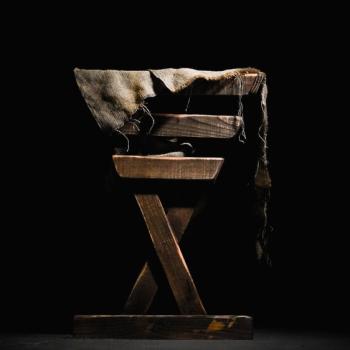Lectionary Reflections
Psalm 118:1-2, 19-29
March 29, 2015
Palm Sunday/Passion Sunday
Here is Palm Sunday again (or Passion Sunday if you prefer). Jesus is once again riding his royal donkey through the eastern gate of Jerusalem, surrounded by roaring crowds, many of whom are anxious for a return of the Davidic monarchy, the romanticized time when Israel was something like a significant military power in the region. Even though the reality of that time, fully one thousand years before Jesus' ride, was rather less than that; the "empire" of David had comprised a nation 120 miles north to south and 50 miles east to west. Small beer indeed, especially compared to the real empires of the day, Egypt in the west and Assyria/Babylon in the east.
Still, some of the folk in Jerusalem were sick to the teeth of Romans, Romans, and more Romans, and were more than ready for God to do something about the scum. God did something, all right, but in nothing like the ways hoped for by the crowds at the eastern gate that day. Instead of decimated Romans, what they got was a crucified messiah, and the Romans stayed in their city, armed and in control, right up until they finally gutted the place some forty years later. As the emerging Christian communities looked back much later on that event, eventually called Palm Sunday though only one of the gospels speaks of the involvement of palms at all, they naturally gazed longingly at their Bible, the Hebrew/Greek Bible for them, searching for clues to the meaning of it all.
Their probing eyes soon lighted on Psalm 118. That choice is at the same time apt and odd. Of course, there are verses in the psalm that appear to illumine that Palm Sunday ride. Psalm 118:19-20 speak of entering gates, giving thanks to YHWH, and announce that this is "the gate of YHWH, through which the righteous enter." Psalm 118:22: "The stone that the builders rejected has become the chief cornerstone" was too good to pass up, proclaiming that a rejected one was and is in fact the most important one of all. Psalm 118:25 cries out, "Save us, we implore you, YHWH," very like what the crowds shouted that day. Psalm 118:26 proclaims, "Blessed is the one who comes in the name of YHWH," a phrase that could also be translated, "Blessed in the name of YHWH is the one who comes," a similar sentiment perhaps with a slightly different emphasis. The former reading, of course, has become a fixed part of the liturgies of the western church. These verses were more than enough to bind Psalm 118 to the story of the entry of Jesus into Jerusalem, and perhaps helped to create the story we read in our gospels, its special contours, its unique flavor.
And the choice is also odd because Psalm 118 is a kind of theological hit parade, with very loose connections from one part to the next. When one reads it in translation, it would be a good bet that the psalm was one of those poetic acrostics, that is, a poem where each succeeding verse begins with the next letter of the Hebrew alphabet, rather like the very next psalm in the collection, 119, the longest poem in the Psalter where every ninth verse begins the next cluster of lines with the next Hebrew letter. In fact, there are a fair number of repeated beginning letters in Psalm 118, but there appears to be no consistent pattern. Such repetitions were doubtless designed for easy memorization, and since Psalm 119 is 176 verses long (!), the young student must have been most grateful for the help.
But reading Psalm 118 through is rather like reading the outline of an unsystematic theology of Hebrew belief and practice. It begins and ends with an identical verse, a sort of creedal claim that every YHWH worshipper would be asked to make: "Give thanks to YHWH who is good, because God's chesed is for 'olam." Both of the words I have left in transliterated Hebrew are most important. At other occasions in these articles I have commented on Hebrew chesed. The NRSV translates "steadfast love," and that is not wrong, but perhaps a bit unsatisfactory. I would read, "unbreakable love/connection," suggesting that there is finally nothing you and I can do to stop YHWH from seeking connection with us. It might be said that this idea is bedrock for an Israelite understanding of who YHWH is. And that reality implies that such chesed, by its very nature, will continue "forever," as most translations have it, though the word, 'olam, has at times a more complex meaning than that. In any case, the poem begins and ends with that famous conviction, as must all talk of Hebrew theology.
Then off the poet (poets?) goes, spouting theological nugget after theological nugget: "Out of my distress I called on YHWH" (see Psalm 130); "with YHWH on my side I do not fear"; "It is better to take refuge in YHWH than to put confidence in mortals" (or "in princes," as the next verse warns); "There are glad songs of victory in the tents of the righteous"; "I shall not die but I shall live"; and other pithy proverbs of a theological bent. And, as I have noted above, there are the verses that energized the early Christians as they came to grips with the events in the life of their Lord.




